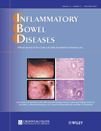Preterm birth but not mode of delivery is associated with an increased risk of developing inflammatory bowel disease later in life
Abstract
Background: Exposure to bacterial antigens and other environmental factors in combination with a genetic susceptibility have been implicated in the etiology of inflammatory bowel disease (IBD). As certain perinatal circumstances, e.g., delivery by cesarean section, predispose to a different intestinal colonizations the aim of this analysis was to define a potential influence on the development of IBD in later life.
Methods: In a case-control study design, birth data were recorded from patients diagnosed with IBD (Crohn's disease [CD], n = 1096; ulcerative colitis [UC], n = 763) and healthy controls ([C], n = 878) by a self-administered questionnaire.
Results: Preterm birth (CD: odds ratio [OR] 1.5 [95% confidence interval 1.1–2.0], UC: OR 1.3 [0.9–1.9]), mother's disease during pregnancy (CD: OR 1.9 [1.3–2.9], UC: OR 1.6 [1.0–2.4]), and disease in the first year of life (CD: OR 2.2 [1.6–2.9], UC: OR 1.7 [1.3–2.3]) are associated with the development of IBD in later life. No significant associations were found for the mode of delivery and breast feeding. In a logistic regression analysis female sex, smoking, appendectomy, maternal IBD, and disease in the first year of life were independently associated with CD. Female sex, appendectomy, and disease in the first year of life were independently associated with UC.
Conclusions: Preterm birth and other perinatal circumstances are associated with the development of IBD, of which disease in the first year of life is an independent risk factor in multivariate analysis.
(Inflamm Bowel Dis 2007)




